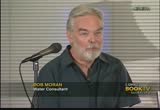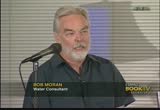tv Book TV CSPAN July 24, 2011 11:00pm-12:00am EDT
11:00 pm
11:01 pm
america. it's a wonderfully written account of both these and beekeepers in the challenges they face and are increasingly stressed world. tonight the land series returns to one of the constant themes of our first ten years. the central role of water in our lives and in the life of our planet. joining tonight is alex prud'homme, author of "the ripple effect the fate of fresh water in the 21st century." a book that helps us appreciate the surprising fact that water, not oil, could be both the defining resources of the next century and the greatest source of global pension in the years to come. combining intensive research with of the journalists knack for talking to the right people on all sides of an issue, alex
11:02 pm
prud'homme has done just this to a very complex subject, and that is a rare accomplishment that the west celebrated many years ago with mark rosner's cadillac desert. and now we have alex prud'homme's freshened global outlook for the 21st century. alex prud'homme is the author of several books including "the new york times" best-seller julia child's my life in france between alex and his great aunt julia. during the question and answer period is hydrologist bob moran the consultant who has worked across the country and across the globe from africa to indonesia, south america and beyond. we are very fortunate to have
11:03 pm
both alex and bob share their perspectives tonight. here's what bill mckibben had to say about tonight's book. both the drought and floods are on the rise and alex prud'homme and his fine account helps us understand why. we've taken the planets hydrology for granted for 10,000 years, and that is a luxury we can no longer afford. please join me in welcoming alex prud'homme. [applause] >> thanks, jeff come and thank you all for coming. it's a great pleasure to be here at the tattered cover. it's important we all support of independent bookstores and the tattered cover has a national reputation i can tell you all of us writers in new york where i live plane to come here so i'm
11:04 pm
very glad to see you all out here supporting the bookstore and reading series like this one. thank you. as jeff was saying, water is a subject of the moment. it's making headlines across the country now. you look at the south and there are record-breaking drought. texas, mexico, oklahoma, florida, many of them are on fire right now. two major fires and arizona, one is the largest in state history. texas has already lost 1.5 million acres to wild fire. florida has had something like 2500 wild fire so far this year. it's a kind of vision of peace and away. at the same time, we have record-breaking floods in the midwest. mississippi and nebraska, the
11:05 pm
dakotas, and there is more rain in the deep snow pack and so it looks as though they may continue well into the summer the be all the way through august. so what's going on here? we have this schizophrenic whether, and it is forcing people to confront water and questions about how we use and value water in a new way. and this is really also an indicator of what's to come despite a denial by some quarters climate change is real. we don't know exactly what causes it, but it's certainly a measurable impact and climate change will speed up the hydrological cycle. that means there will be more water vapor in the air. that means there will be more rain, storms, intense storms. it will change local weather patterns. some places that are now dry will become wet and vice versa.
11:06 pm
or places that are very dry will become even dreier, places wet especially on the coast will become white. so this is a sort of indication of things to come. the good news is that we do have a series of steps we can take and strategies that will help us negotiate this new environment. should we care to apply ourselves. unfortunately, as my pal john stewart said the other night, human nature we tend to wait for things to become a crisis before we do anything to which i said to him backstage with water we can wait for a crisis it is going to be too late. so, for my perspective, this week up call we are getting this year, right now it's something we ought to pay attention to and start having a very serious national discussion to water and our relationship to it.
11:07 pm
now, i came to the subject from way back as a kid i was always a obsessed with water and i loved to fish and swim and a boat. i was and oceanography minored in college, but the specific impetus for this book when i was working with julia child on her memoir my life in france and the apartment in san monaco we were having lunch together and julie yadin shelia pulled out a bottle of french mineral water, and she started to tell me that the french view mineral water as a health 80 essentially by particular mineral waters for their particular mineral flavors and alleged health benefits. they view mineral water as a digestive it helps your digestion and the tree to bottled water almost like wine. americans of the of your hand like their water stripped of all
11:08 pm
minerals, and we prefer to think of bottled water as a healthy beverage, an alternative to soda. i thought that's a nice idea for an article, the look at the culture through bald water. filed that way. in that evening we had dinner with julia's niece and her husband. as jeff said he's a hydro biologist who travels around the world doing interesting water projects. i.t. give him as an indiana jones of water, swash bucket watering the i come and he started telling us that water is in excess resource meaning it is the resource that underlies all others. so whether you're talking about agriculture or mining or oil and gas extraction or power generations, all of these things require large volumes of water,
11:09 pm
and this century not long from now, and it's starting to happen now, these resources are going to start to come into conflict with each other because there was a limited amount of water, and this is going to force another series of very difficult questions. how do we prioritize water use, where, when, these are not m. search questions, they are difficult to read do you farmer that land in montana for alfalfa or you use the water to try to extract oil and gas and a mind nearby. you can't do it all. at the same time the population is growing as the population grows there's greater demand for water and for goods so these are going to be very difficult questions to answer.
11:10 pm
so this got me really excited and i decided well for the article because this is a book. so i had to finish julia's book and julia died halfway through the project and her book came out. it was successful and i went on a book tour, and even while i was on the book tour on began to report this book and began collecting data, and by the time i got back i had a huge amount of information. i start in new york where i live and i discovered practically in my backyard is one of the largest oil spills in the world. right in the center of brooklyn new york. the densest population center in the country and it's been there for over a hundred years. it was entel deepwater horizon the largest oil spill in america and nobody knew about it. it had been conveniently
11:11 pm
forgotten about, despite the fact that the oil underground spontaneously combusted at one point, and despite the fact there were cancer clusters around their. i was shocked to learn this and uncover with some help uncover that. i discovered -- i went on to new york city's new giant water tunnel number three, 600 feet underground is a fast tunnell that they are boring out as quickly as they can because the tunnels number one and number two are about to collapse the-years-old, then i went to poland springs me and with people concerned about the aquifer being used for boiled water. went down to new orleans and investigated the levees that collapsed during katrina. went to dallas, texas, went to nevada and phoenix, went to los angeles, and then i went out to alaska, where i discovered with bob's help, a really interesting
11:12 pm
so-called resource which is putting the salmon and the people and animals who rely on them against a potential giant new copper and gold mine which sits at the headwaters of some of the very important salmon spawning streams and has caused a huge debate in alaska that features sarah palin, and i had these incredible adventures writing this book but then came the question how do i explain all this to people? how do i break this information down so that the public can understand eight and make sense of it and hopefully be entertained and provoked by it? and what sort of tone do i use? what i did is i structured the book in four parts. part one is on water quality, that is what is in our water? you might be shocked to find out and what we are doing about it.
11:13 pm
part number two is about drought, how certain parts of the country are drying out and what we are doing there. part three is about the flood and part four is about water in the 21st century. how we are using it now and will use it in the future. part number four was the one that gave me the biggest headaches. how we are using water now and in the future because water is constantly evolves and as a subject. so i would cover an aspect of this and in the next week something would change. so, you know, i was sort of writing in real time which for a book is difficult. but one of the subjects that came up that i found really fascinating was the subject of privatizing water. i will turn to that in the second, but i want to read you the opening of the book because
11:14 pm
it shows you how water is a life-and-death issue that when you look at it through the prism of one particular story it raises all sorts of other questions. this was a section called under pressure and it's the prologue of the book that leads into the water quality section. 35 feet down on the bottom of the concrete tank filled with a million gallons of bitterly cold water laid of body. the tanks 50-pound late was slightly askew. it's usually secure bolts were missing. shards of glass, their remains for taking water samples were scattered across the concrete floor. this was early february of 2005 and the state of the art water purification plant in suburban new jersey. the victim was a well liked 43-years-old hydro chemist. she was the mother of three, the wife of a banker, had a ph.d. in chemistry from n.y.u. and worked at the valley water commission planned for 12 years.
11:15 pm
in 2000 for the plant underwent a $70 million upgrade during which chlorine treatment system was replaced by an autozone system. at the same time promoted to senior chemist. a job was to maintain water quality standards set by the epa and to oversee the new ozone generator is which would suffer from the cracks and other problems. a colleague recalled during the plant's re-dedication, it was in such a fabulous mood but other people around her were not. an autopsy showed it had been forcibly subdued but she was still alive when she fell or was pushed into the tank. there was no way out said the prosecutor james of equiano. the water level was 5 feet below the opening. it was pitch dark, ice cold 36-degree water. there were no letters. was a horrible way to die. there is no doubt that this is homicide. the treatment plant sits on the outskirts of a bustling suburb
11:16 pm
of 10,000 just west of manhattan. the plant terrifies 83 million drinking water a day. although new jersey its relatively large water reserves the state's rapid growth has put tremendous pressure on its water supplies. towns are competing for the same resources. water rates were rising, decades of pollution of poison aquifers and some de the constrictor is aging. she is proud of her work at the treatment plant and she always conduct in her local water tests conscientiously. on the day she went missing she was alone by the water tank for a short time. that afternoon colleagues noticed an odd sight. and and eaten sandwich in her on peccable desk. they began to search for her but didn't call the police for ten hours. the following afternoon police divers were called in and discovered her clipboard at the bottom of a tank. but unger's body had migrated into the second tank, the clear well and there wasn't discovered until hours later.
11:17 pm
plan administrators worried the water might have been contaminated decide to drain the entire 1 million-gallon tank. by the time her body was recovered, chlorine used as a cleansing agent had destroyed any potential dna evidence. the news of her death spread in the surrounding communities and rumors flew. officials canceled school in the local business is temporarily closed. a dead body will generally seen as soon as the aretz longs is replaced by water. once submerged liquids and feces is keep the cadaver that begins to decompose rendering of the water on healthy to drink. as a precaution against contamination be issued a baliles order is suggestion that citizens boil drinking water to purify it to 17 towns. the citizens of passaic county were forced to confront an uncomfortable fact, the heretofore safe, dependable, pouring water supply was not as secure as they always assumed it was. investigators were unable to
11:18 pm
discover the clear motive for unger's killing but felt sure of one thing the plant was protected from outside intruders so she was likely murdered by one of her 85 co-workers. three of the co-workers were especially suspect because the stories didn't add up but with a clear motive for proof of crime, the investigation stalled. in 2006. the detectives were no longer working full-time on the case but remained technically open, and therefore i was not allowed to view of a fellow - investigative files. with unger's death still a mystery questions remained. why would someone murder a respected hydro chemist? did it have anything to do with the quality of water plant? had the water at the pd w turned a pinkish color the week before the merger as unger confided to her husband? if so what does that mean. did ungra blow a whistle on a colleague? to the expense of ozone
11:19 pm
disinfectant system which it cost ungra's headaches for weeks of some kind of embarrassing problem? had she stumbled over something illicit such as a drug dealer or tristan's some have alleged? to the public the most pressing question surrounding ungra's death is how could a body into the drinking supply in one of the nation's densely populated regions and remain undetected for a day and a half without sounding alarm? the answer was in the pwc tank the center designed to warn of any change in water displacement wasn't working. so when ungra was pushed or fell into the water tank no alarm sounded to see something of 175 towns entered the water. it could have easily been 175 pounds of cyanide or a biological weapon. this revelation led to further questions. if a body could contaminate 1 million gallons of water with no warning, then what other contaminants might lie on identified in the drinking
11:20 pm
supply? in light of the september 11, 2001 terrorist attacks and nearby manhattan, the treatment chemicals which is korean, a potentially deadly gas that was used as a chemical weapon during the first world war, or they used properly and secure? the pwc is a typical mid sized facility and one had to wonder are the water supplies of utilities across the country also vulnerable to contamination? with a natural, accidental or deliberate poison. who monitors american water and how good a job are they doing? the issues raised by ungra's def lead to broader questions about h. teal and forced people to consider a resource they never had to think about before. these are water clean enough to drink. are we running out of it? will we be inundated by too much water? how exactly are we using it and what are the repercussions of that use? in short, what we know about the supplies of water and what don't we know?
11:21 pm
so, that's the beginning of the book and it leads you into the water quality section in which i discussed some of the legacy pollutants' that have been left over from the industrial growth and some of what are called emerging contaminants that we better get a handle of because they are causing all sorts of new things to happen such as intersex fish which is something investigated in chesapeake bay right now where the male bass are growing eggs and we believe it's because of chemicals particularly herbicides will use on the lawn for dandelions are getting into the water and disrupting diem do krin system so it's a fascinating section but there's also some solutions in there about what we might do about these things.
11:22 pm
part two is about trout and part four is about water in the 21st century. as i mentioned, one of the questions for the coming decades as the water privatization. that means a private company or individual buying up the water or taking over the water utilities and charging a fee for the use of the water. this practice began in napoleonic france, and those companies are still win business. they are now global. they are here in the u.s., and they are rather profitable and controversial. the reason they are controversial is because the privatizing of water gets to the moral question is water a common like the air we breathe and therefore should be free to everyone? or is water a commodity like oil
11:23 pm
which would be extracted and processed and sold on the market this is a very difficult question to answer. bader, a private water companies have successes where they've gone and 62 devotees and have provided clean water at affordable rates. there's also been times when private water companies have taken advantage of drought and gouged a client's in places like ohio and atlanta and california and central america. probably the most notorious case some of you may know took place in bolivia. in 2002 when bechtel privatized the water system and started
11:24 pm
fixing of futility but started charging ever higher water rates and a lot of the people there couldn't afford it and began to protest, and the protests grew and grew and turned into riots and the army was called in, and the army shot a 17-year-old boy and killed him and it happened to be captured by a tv camera and this led to a massive protest it wasn't always about water but water was one of the sparks coming and it is essentially shut the country down and led to the ousting of president hugo monster. that was a notorious case that got a lot of press. but it's not always that way. in the u.s., the privatizing of water has been a dream of entrepreneurs for many years and it's often allied with a pipeline or project. we are at the point now where we always used to build our
11:25 pm
communities next water supply for obvious reasons but now we've gotten so good at manipulating nature that we can build our communities wherever we like we can build them in the middle of the desert or on the top of a mountain and then we can bring the water to us, which is a pretty interesting phenomenon. but these water diversion products come at a price. they are environmentally destructive, they are not always that efficient, and they are often controversial. right now, as i mentioned, texas is immediate drought, worst drought in 45 years, and there's one guy that is hoping to profit from that. he may have heard of him. his name is t. boone pickens, famous screen mailer from the 80's who then got into leal and gas. he is now a millionaire. you never know. sometimes a multi-billion and
11:26 pm
someone is just a billionaire, depends on how things are going for them. but he's got control over a good portion of the west coast natural gas fueling business a couple of hedge funds and the juliet buck i was in dallas and made an appointment. to give you a sense of the kind of guy who knows about resources and thinks that as he put a hydrocarbon era is over. bader is the new oil. that is t. boone. one afternoon in october, 2006, t. boone pickens tilted his land 78-year-old body back in an enormous chair in his dallas office and propped up his black cowboy boots on the corner of his desk and gave me a look. it's just getting draw your and
11:27 pm
dry year he drawled in an amused voice and handed me articles about water, his water company. many of which were critical of the plans to suck water from the aquifer, which is the largest aquifer in america that underlines each state. it is also being rapidly depleted by people who are pumping it mostly for a culture but other reasons as well and there's a great deal of concern. the articles also noted a lack of rain combined with a population that he could push texas into an unprecedented drought. he signed up 200 landowners representing 400,000 acres in roberts county where his ranch is. to participate in a deal between the water and a thursday mitropoulos willing to pay the rates. she had no by years yet but pickens is a legendarily patient steelmaker.
11:28 pm
the offer is just surplus water, he said as he sketched the pipeline route on a white board. that water is just stranded out there doing nothing. it's not needed in the panhandle which is a tough country not suited for farming. why should i store water for nothing? you have an asset but it's dead until you create a market for it. meanwhile north texas is exploding. why not pipe the water out to help the rest? we have everything in place. eventually someone will need to buy our water. t. boone pickens figured if he could convince dallas-fort worth to spend 165 million to buy 65 billion of the water a year for three years his roberts county investments reported the $150 million by 2008 what net the water over $1 billion. despite many contingencies such as the dallas officials remain noncommittal, pickens crowed this could be the biggest deal of my life.
11:29 pm
the water pipeline would cross the private land. to make this feasible i should explain he has a ranch in the texas panhandle in the northern part of the state and he plans to build a pipeline from his ranch down to dallas-fort worth. but to do that he would need special exemptions because would cross private property. it would cross private land. to make this feasible he would have to negotiate with hundreds of individual property owners or find another way to gain access to their land. it wasn't clear what the other way might be until 2007 when the change in the state law made by governor rick perry allowed him to form a new water district, the robert county fresh water supply district number one. the power to levy taxes and most important use the power of eminent domain to claim land for the pipeline. eminent domain is a doctrine
11:30 pm
dating back to 1066 in william the conqueror by which the government can take or force the sale of the private property for the public good. as the full implications of pickens knew water district sank in the panhandle residents reacted with a mix of anger. the mixture at the report many seem stunned such a district with such broad reach the roberts county water district would not have been viable without the recent legislative changes charged texans for public justice which opposed it it again spokesman the scriven connection between the donation to the legislator and passages of the law. pickens opponents fear that he would poke with such a long and deep straw that he would suck unsustainable amounts of ground water from beneath the texas panhandle decrying him as a water hustler who would turn it
11:31 pm
into a dust bowl for his own profit. critics such as ken kramer director of the chapter of civil sierra club had deemed it to ground water mining. the technical term for pumping water from an offer faster than nature can replenish it. according to the texas 5540 anyone who receives a pumping permit could draw down an offer by no more than 50% over the next 50 years. the rule was put into place by ce williams who runs the panhandle ground of conservation which manages the share. mining ground water is unsustainable. it's like taking dollar bills all of your bank account and putting nichols back in. even a with a big bank account there is an end to it. that's pretty much what is happening. when i pressed the depletion question, he shrugged and said look, they recharge 5% a year with rainwater to read others claim texas portion of the aquifer is much less one tent for%.
11:32 pm
i get pumped down to 50% but not hurt anybody. we will never punted try and why would i? i live there. i've got about 100 million invested in my property. it's even got a golf course and flashed a quick grin. this is a forever supply of water. mesa will require the rights to sell between 200 to 320 acre-feet of water per year which is enough to supply 1 million to 1.5 million texans. the panhandle counties roberts, and ogletree that would take part in such a deal set over 81 million of the water. as pickens sees it, water is like any other resource. it's a commodity just like a wheel that should be prospect and sold for profit. i don't think you should cut people off from the water. everyone deserves a bite of the apple. it will provide us with a secure drought source for the future.
11:33 pm
in the summer of 200960% of texas suffered extreme doubt but by february 2010 el nino weather patterns have brought enough rain to lift the drought for much of the state. the water had yet to find a buyer and pickens had been distracted by other projects. by then he was worth some 1.2 billion thanks to the dominance of the west coast natural gas business and the success of the hedge fund. it would be foolish to believe that he'd forgotten about the water as a commodity through the purchase is he's built the ranch up to 68,000 acres which not only made him the largest land over in roberts county but gave him control of more permited ground water than any other individual in the united states. and people have the water that want to sell it and the people will buy the water when they needed. that's the blogs ghats and feathers of the thing. so that t. boone.
11:34 pm
i want to see something about the title, "the ripple effect," aside from the obvious reference to water i chose that title because it's my observation every time we use water it sets off a series of ripple effects, the consequences that we don't think about this is true for the simplest thing like washing your hands or watering your lawn or using electric power which requires water and if you wash your hands of antibacterial soap it gets into the water system and its antibacterial to read it kills bacteria which is the foundation of the food. but it also lowers the resistance to the disease. the herbicides on the lawn i mentioned can lead to the intersects and cancer in fish and why should we care about
11:35 pm
that? defender crème system of fish is almost identical to that of humans. what are we doing to ourselves? we don't have an answer for that, and scientists are very concerned and doing a study right now. power requires a lot of water to the to water whether it is hydro or nuclear or ethanol so the industry extract billions of gallons probably trillions of gallons from the ecosystem every year and then emits pollution and that has a tremendous impact on the ecosystem and us. i would like to remind everyone that every time you use water there is a ripple affect. thanks a lot. now i'm going to invite -- [applause] >> thank you. we will take questions but before that i would like to
11:36 pm
invite bald to join me. she's one of the guys that got me in this project and the apropos of the pickens story back in 2007, bob and i drove from denver down to the san luis valley and investigated a sort of similar situation. underneath the valley right by the national park there is a place we met down there, we traveled down there together, and bob, tell me about the valley. >> well, it's basically a spreading center on land that is filled with in places 20,000 feet and its much of it filled with water to it when i started working on it in the
11:37 pm
70's you could go down there and the wells, many of them are what we call artesian and a wood float without a pump in the winter you would go down and there would be 10 feet high ice fountains next to the homes because they would freeze under natural pressure and then they would freeze, but it's also on an area where the water flows into the rio grande, flows down gradient and then supposedly flows into mexico. it does flow in but by that time it is greatly depleted and greatly contaminated, so there's been tremendous disputes over the spirit several governors of colorado. >> to cut through the chase, there was a guy named lawrence strong who was a canadian oil man and he bought the ranch for complicated reasons we won't go
11:38 pm
into and decided to live there and always said he wasn't really aware of the water under the ranch, but lo and behold he discovered there was a great offer, and at this point denver was blooming in the summers here expanding running out of water supplies and of by the interesting ideas of the water of the aquifer in a paper cup. the same money t. boone was looking at and one of the things he did is he hired some law firms and tighter geologists' to get his property. what can you tell us about morris strong. >> morris who ran the company that took over she had been the
11:39 pm
head years ago and had lot of champions. people thought he was quite a guy, reputable person. he had refugees but he also was the head of the wheel shale company or one of the senior executives that have already drilled out for oil and gas so they knew what they were getting after and all of the suburbs of denver were growing in the 70's and 80's and using a lot of canadian money the plans for diverting to the front range or one of the texas markets were mexico markets. >> there was a big controversy in the farmers in the finale didn't want their water sucked away. morris strong said he was only trying to do good thing, didn't
11:40 pm
want to hurt anybody denied permits to do this that one of his main antagonists and rancher from the valley he had been taunting him decided this was a good time to step in and tried to do a similar deal. it brings out the best in people. and he caused another controversy and he ultimately was shot down. it was arranged with the federal government to name of the great sand dunes and national park and they thought that they had everything safe and secure. when flow and behold, an oil and gas exploration company called oxfam which is based in canada
11:41 pm
and their partners conocophillips revealed they had a senior water rights which means that the of the oldest water rights for a very ecologically sensitive area the wild life preserved on their an idiot to the right to go in and drill and this caused a huge uproar they were right, the legally have the right. there's been a lot of wheeling and dealing, and the last i heard about this, the water rights have been purchased by the state or the fed, and they are now officially off the table and i think it's gone away for now. but your family is a long history of dealing with water in the west. the privatizing of water, the municipalities, big cities have
11:42 pm
to get water from distant places, probably the most notorious was los angeles's water grab from the valley, 285 miles away. his father happened to be involved in that case and i encourage you to read the book, but you know, one of the things that keeps coming up is that if people know that there is water there they don't forget. and they wait. so what do you think is -- do you think of water rights are safe and secure? >> the truth is i don't know the latest details but as you told that story i had a different thought. the water rights system actually has one other group that is more senior to the formal groups that have filed for the water rights of native americans come and that one almost always gets overlooked because they don't have enough firepower in the courts, and i think that
11:43 pm
ultimately if someone will enforce what is called the winners doctrine, that will be a pivotal issue in the west. >> this brings up another interesting issue which is that traditionally in america the water war fought have been over surface water which is to say rivers, streams, lakes, but is it fair to say that the water war of the century will likely be focused on ground water? >> essentially every to cut a peace deal between palestine and israel has faltered over 50 years of the ground water. >> i think there's a lot more ground water in this country is in the right? so the chances are that as a population booms come as the climate changes and new pressures come on to the water supply your going to be seeing a lot more fights over ground water. what does this mean for guys like t. boone pickens and morris strong is there a future for these guys and these
11:44 pm
entrepreneurs which privatized water here. environmentally aware enough. i don't predict the future very well. one really did change that was happened over the last 40 years was that we've tended to privatize the science on this. so now it's easier for an investor to hire his own consultants to generate his own answers and the public has a hard time knowing what is the real story. we need to go back to having some independence and science in these arenas. last question denver was the market that morrison legend for
11:45 pm
his water and denver continues to thrive. what do you think? to use existing to be private water brought at some point? >> clearly there will be. but we also have suburbs down in douglas county were other areas where the original water table has dropped several hundred feet so it is a major issue. >> i'd be happy to sign books and hear your water stories in a minute, but first of all of their are any questions, bob and i would love to hear them. >> one reason we don't manage it well as the issue of social equity and i was wondering do you touch on the valley and the pricing of water in your book and the solutions to that?
11:46 pm
the volume and pricing of water is part of this issue that is so contentious and it's fast way to simplify it it breaks down this way. if you don't price water people tend to use it wastefully because there's not an incentive there to concert and be efficient. if you do price water but the price it too high, you are playing with people's lives. bader, unlike oil is an essential resource, and the criticism of the water pricing is people can't afford it. the experts i talked to, and maybe you can respond to this also the people i've talked to have said the answer is somewhere in between. certain amount of water per person per day and the figure that was given to be is about 13 gallons per person per day
11:47 pm
and then beyond that we use the tiered pricing system so that those who use the most water pay the highest rates. and this has been tried before. it happened in santa barbara about 20 or 25 years ago when there was a terrible drought and the instituted a tiered water system, water pricing system it really reduced the watering but it wasn't perfect this is one of those tricky issues we are going to have to grapple with. t have anything to add? >> to comments, first part of the problem in the west has been aggravated by the role of the federal government to various engineering and water agencies using subsidized funds that have conveyance channels and so on, so it cut the price of water artificially low for decades and decades second, the answer to
11:48 pm
the question depends a lot on where you are. there were the riots those people get crazy when he mentioned the idea of putting a price on water what we call the field people they can't afford that and also to come from a background where they believe the waters are a right to them any way. i'm not saying that is the right answer but it's a different story in very poor countries. >> i'd like for a moment the things he said. you refer to the population you use the word sustainable, and i'd like you to discuss the concept of carrying capacity and also the fact that you've actually everybody has been in the position just about on this dealing with the resource
11:49 pm
constrained may elude two or mention the population but fails to acknowledge we have tax policies that encourage and lots of policies that incurred, and we should not, i would suggest, consider it as a given and that the conversations about constrained resources ought to deal also with issues of population and population growth and capacity and honest definitions of what sustainable really means. >> that's a big one. we very quickly got into the mention of a 1960's and 70's and 80's professor. he had the guts to basically say that there were limits to growth and there should have been limits to population. it's fundamental to what you're asking. politicians cannot even talk about it. i think if you examine the last
11:50 pm
presidential election there wasn't one mention of population i would add that there's a disconnect between land planning and water planning. what tends to happen in this country as we plan a community on the desert or somewhere there is and water and then we worry about the water. rather than building communities where the water is and having a rational growth based on water supply. this leads to another question on this country the eastern border law and the western water law are completely different. there is no one holistic system. we don't have a national water board as for example singapore does. singapore has the most efficient water system in the world and is a very different country than we
11:51 pm
are and much smaller, but it's a useful model and at the end of the book i talk about the limits to growth and i raise the issue that maybe we ought to start thinking about our national water supply and in a holistic way that the federal level. we ought to have a water board or national water czar. this is heresy and would be politically difficult and we need someone to connect all the dots and start thinking about. >> we are here with the technology seem to dana sorkin everything out of water for recycling. how do they deal with recycling of water. >> we actually have some lawyers in the audience. would be better to ask them. i don't know all of it, but i do
11:52 pm
know that individual industries have been able to lobby for different legal approaches to what they do with treated water in terms of recharging it into the ground or disposing of it into the ocean. there's not a simple answer but i don't know the legal part of it. senator and a free reader rabbit up. thank you very much. that we provoked you and take what we've heard today and think about that and maybe even take some action. thank you very much. [applause] for some information visit the author web site, alexprud'homme.com. >> carl elliott, what is your book about?
11:53 pm
>> it's about the way that medicine has changed as has been transformed from a profession to a business essentially. traditionally medicine has been largely a self policed honor based profession and over the past 30 years or so it has been taken over by a range of market based forces in clinical trials industry and medical education industry a whole range of profit based businesses which because of the fact madison is traditionally sells regulated now operate without a role of oversight. >> what are the root causes of that? >> of the transformation? >> a lot of things.
11:54 pm
part of the interest in the book is the emergence of the pharmaceutical industry as a huge force beginning largely in the 1990's, and the was the period and which the sort of age of blockbuster began so the drug companies started hitting for the fences looking for drugs they could market to as many people as possible, usually for my old chronic illnesses. when the pharmaceutical industry started to become so enormously powerful, its influence over medicine began to go much stronger and so you had the emergence of the clinical trials industry and the medical education industry, oversight, priced at research for profit institution boards. i think a lot of people don't realize exactly how profitable
11:55 pm
the pharmaceutical industry has been over the last 20 or 30 years, and its been tremendous. >> what's your experience with that role in the pharmaceutical industry currently has a doctor? >> i don't practice medicine. i originally trained in medicine. went from madison to the philosophy graduate school in the last 20 years or so on medical ethics and philosophy. the root of the book begins with a phone call that i got when i was at the university of minnesota from a local psychiatrist who wanted to sit in on a medical ethics course i was teaching and explained to me that this was because he was being disciplined by the state licensing and a problem with a research study that he was doing
11:56 pm
his punishment was that he had to take a course in medical ethics, and not knowing any better i said sure. and it went fine. a few years later, a contract research business opened up in the twin cities where i live and a for-profit clinical trial and i had an interest and fees and started doing some digging and looked to see who the researchers were doing clinical trials, and i saw that this guy that it to in my class was one of the researchers. so i started to think i wonder exactly what he did to become -- to be disciplined by having taken the class. and it turned out that his license had been suspended for two years because he was responsible for the death and injury of 46 different patient is a number of whom committed
11:57 pm
suicide from 17 of whom were in research studies that he had done largely seriously mentally ill patients often with chronic schizophrenia many of them suicidal she was cycling in and out of research studies often research studies for which they were not eligible and keeping them in the studies even after they started to deteriorate. one of them actually had committed suicide in our teaching hospital at the university of minnesota, and what struck me about that is that his disciplinary file wasn't hard to find. i could find it within minutes. if you put his name in a google search all his problems came up the very first hit to and yet despite the fact he had been judged responsible for the death and injury he was still allowed to do trials. the fda hadn't sanctioned him
11:58 pm
come and go pharmaceutical industry was still willing to hire him and is still working for the pharmaceutical industry now. and this sort of shocked me that a researcher this dangerous and this bad was still allowed to do clinical trials and had pointed to me just how weak our oversight system is. >> so in your research how often did you find that was the case that researchers that violated ethics laws were allowed to continue conducting research if it was for a privately contracted institution verses on a university campus? >> nobody really knows. that's the difficulty because there is no one keeping up with this information. the reason he was able to do this is simply that nobody was watching. and still nobody is watching. you know, do have state
11:59 pm
licensing boards but they are not responsible for the clinical research. you have local institutional review boards, these are the committee is supposed to be overseeing the clinical research, but now these are largely private, for-profit boards paid for by the sponsors of the research. and if they don't like the answer they get, if one tells them this is on medical research because then we go to another one and another one until they get the answer they want. the fda which is supposed to be nominally interested in protecting subjects of research only inspects about 1% of the trial sites, so 99% of the sites go unexpected, and for that reason i can't answer that question, nobody can. because nobody's watching. >> what would your recommendations be to improve the medical industry in particular that process?
168 Views
IN COLLECTIONS
CSPAN2 Television Archive
Television Archive  Television Archive News Search Service
Television Archive News Search Service 
Uploaded by TV Archive on

 Live Music Archive
Live Music Archive Librivox Free Audio
Librivox Free Audio Metropolitan Museum
Metropolitan Museum Cleveland Museum of Art
Cleveland Museum of Art Internet Arcade
Internet Arcade Console Living Room
Console Living Room Books to Borrow
Books to Borrow Open Library
Open Library TV News
TV News Understanding 9/11
Understanding 9/11


























































